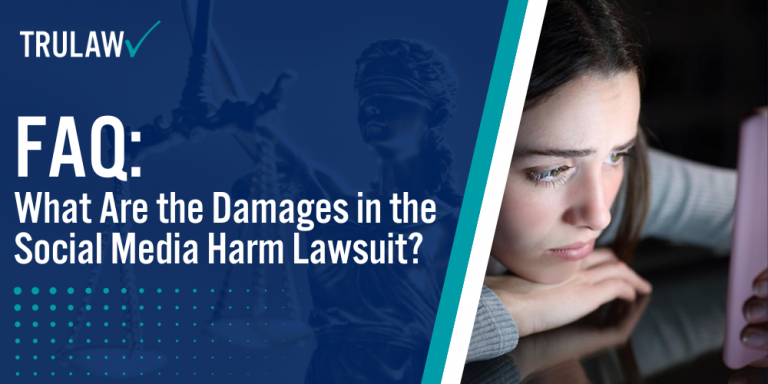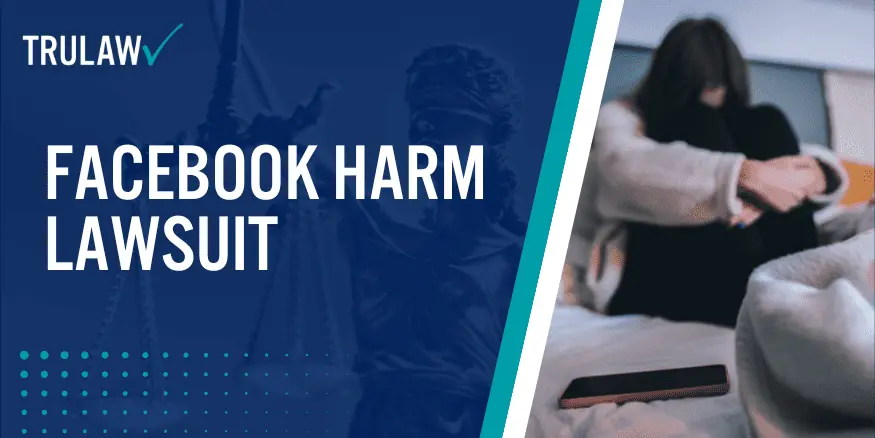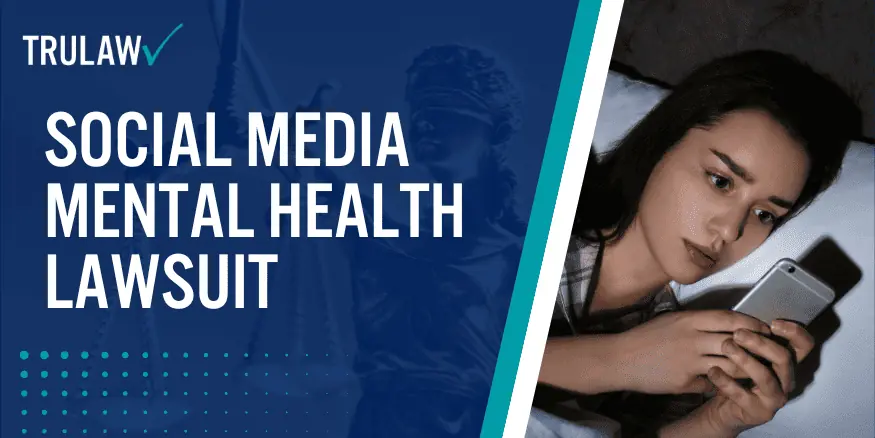How to File a TikTok Mental Health Lawsuit?
- Last Updated: July 9th, 2024

Attorney Jessie Paluch, founder of TruLaw, has over 25 years of experience as a personal injury and mass tort attorney, and previously worked as an international tax attorney at Deloitte. Jessie collaborates with attorneys nationwide — enabling her to share reliable, up-to-date legal information with our readers.
Legally Reviewed
This article has been written and reviewed for legal accuracy and clarity by the team of writers and legal experts at TruLaw and is as accurate as possible. This content should not be taken as legal advice from an attorney. If you would like to learn more about our owner and experienced injury lawyer, Jessie Paluch, you can do so here.
Fact-Checked
TruLaw does everything possible to make sure the information in this article is up to date and accurate. If you need specific legal advice about your case, contact us by using the chat on the bottom of this page. This article should not be taken as advice from an attorney.
Key takeaways:
- Check if TikTok contributed to mental health issues like depression or anxiety and gather evidence such as medical records and usage details.
- Consult with specialized lawyers at firms like the Social Media Victims Law Center for guidance on filing a lawsuit for social media apps.
- Document all harmful interactions on TikTok, including screenshots and records of time spent on the app for your case.
Overview of the TikTok Mental Health Lawsuit
On this page, we’ll discuss an overview of the TikTok Mental Health Lawsuit, covering the legal grounds and implications, the role of New York City in the TikTok mental health lawsuit, tech companies’ response to the TikTok mental health lawsuit, and much more.
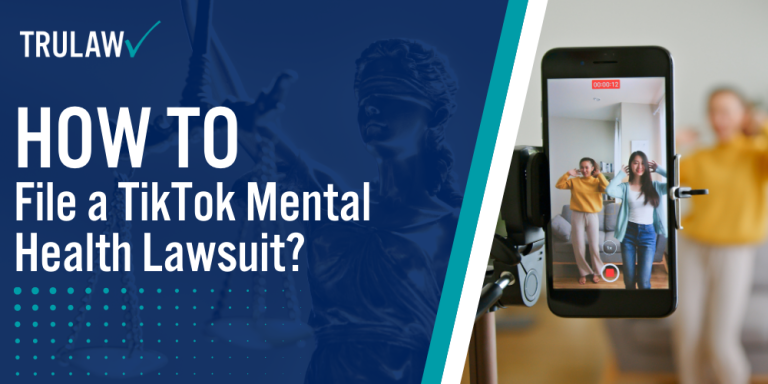
Intro to the TikTok Mental Health Lawsuit
The TikTok Mental Health Lawsuit stands on several legal grounds:
- Public Nuisance: The lawsuit seeks to hold TikTok accountable for creating what it considers a public nuisance, affecting the well-being of younger users.
- Consumer Protection Violations: Accusations against TikTok include violating consumer protection laws by promoting harmful content.
- Financial Compensation: The legal action may also seek financial compensation for those affected by the alleged negligence.
- Precedent-Setting Potential: Establishing a precedent may influence future regulations on companies operating TikTok and similar platforms.
If you or someone you love has struggled with mental health challenges related to TikTok, you may qualify to file a claim.
Contact TruLaw using the chat on this page to find out if you qualify to seek compensation in the TikTok Mental Health Lawsuit today.
Table of Contents
Legal Grounds and Implications of the TikTok Mental Health Lawsuit
The lawsuit alleges that TikTok’s algorithm prioritizes content that can be detrimental to mental health.
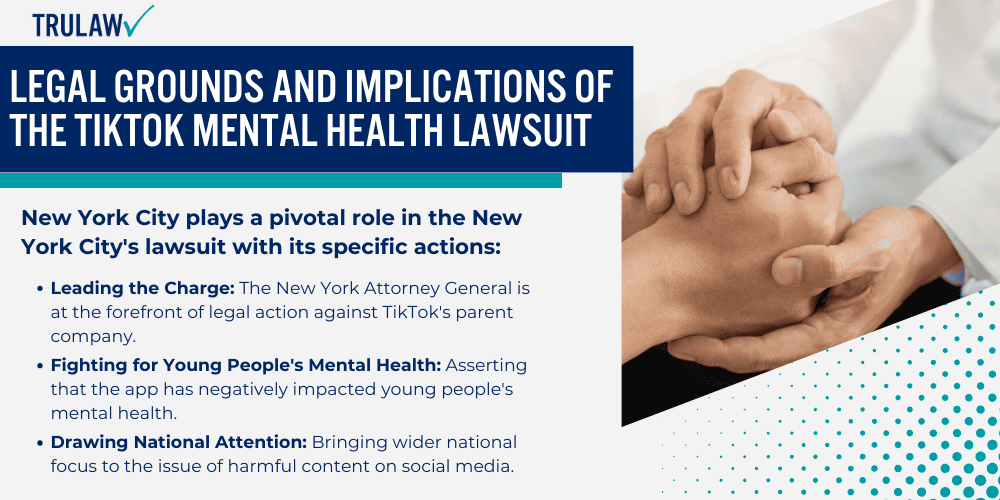
As a result, the lawsuit seeks to hold the platform accountable for the impact of their platform.
The plaintiffs argue that the algorithm’s promotion of certain types of content contributes to increased anxiety and negative self-image among users, particularly young people.
This legal action highlights growing concerns about the potential harm caused by social media algorithms.
The Role of New York City
New York City isn’t just a bystander in this lawsuit; it’s the driving force behind it.
By spearheading this legal action, the city is taking a strong stance to protect its youth and hold social media platforms accountable for the potential harm they cause.
New York City plays a pivotal role in the New York City’s lawsuit with its specific actions:
- Leading the Charge: The New York Attorney General is at the forefront of legal action against TikTok’s parent company.
- Fighting for Young People’s Mental Health: Asserting that the app has negatively impacted young people’s mental health.
- Drawing National Attention: Bringing wider national focus to the issue of harmful content on social media.
- Push for Policy Changes: Encouraging developments in regulatory policies governing social media platforms.
Tech Companies’ Response to the Lawsuit
Facing the accusations head-on, tech companies, including TikTok, have countered the lawsuit’s claims.
They deny any wrongdoing and have outlined the measures already in place, along with future commitments, to prioritize user safety, particularly the well-being of young people on their platforms.
Tech companies, including TikTok, have issued responses to the allegations:
- Denial of Wrongdoing: The lawsuit’s claims of harmful practices have been firmly denied.
- User Safety Measures: Describing the steps they have taken to safeguard their user’s mental well-being on the platform.
- Cooperation Statements: Some statements express the companies’ willingness to cooperate with investigators.
- Future Commitments: Declarations of intent for ongoing improvement in protecting young users and content moderation have been noted.
The Growing Mental Health Crisis Among TikTok's Youth
The increased scrutiny on TikTok stems from concerns about the platform’s potential impact on the mental health of young people, particularly within New York City which hosts the country’s largest school district.
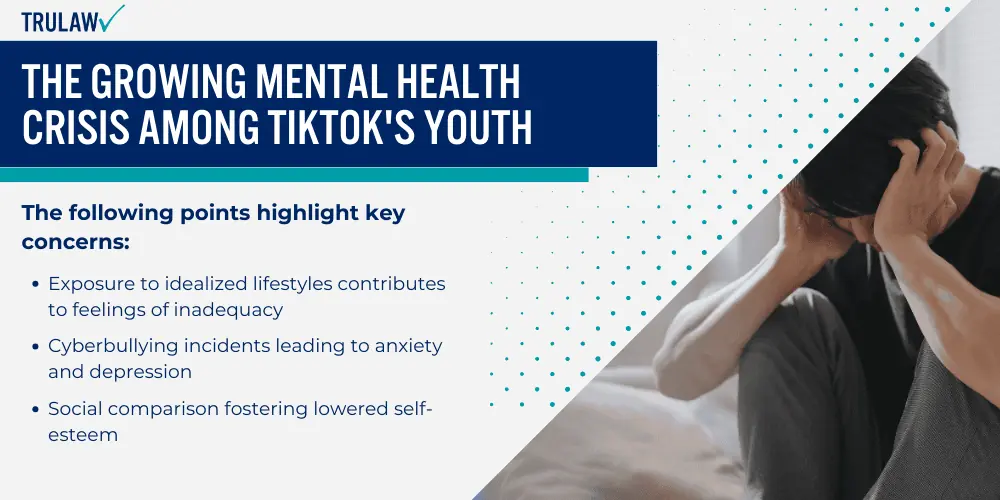
Impact of Social Media on Youth Mental Health
Research indicates a correlation between social media use and mental health struggles among the youth.
The following points highlight key concerns:
- Exposure to idealized lifestyles contributes to feelings of inadequacy
- Cyberbullying incidents leading to anxiety and depression
- Social comparison fostering lowered self-esteem
- Overuse disrupts sleep and physical activity patterns
- Peer pressure can result in negative coping mechanisms
Emergence of the Crisis Over the Past Decade
Over the past ten years, there has been a significant upturn in mental health issues among adolescents.
The crisis is evident in various facets:
- Increased rates of depression and anxiety disorders among teens
- Rising cases of cyberbully-related traumas
- Greater demand for youth mental health services
- Lowered resilience as observed by mental health professionals
- Public awareness and outreach campaigns attempting to address mental wellbeing
Actions by New York City’s Public Institutions
New York City spends more than $100 million on youth mental health programs and services each year.
New York City’s response to the youth mental health crisis highlights the urgency of the situation.
Efforts taken by the city include:
- Expansion of youth mental health programs in public schools
- Integration of mental health education in the school curriculum
- Investments in the public hospital system to provide better mental health services
- Litigation against social media entities believed to exacerbate the crisis
- Monitoring and research initiatives to evaluate the impact of social media on youth mental health
- Public campaigns aimed at raising awareness about the New York City health struggles and available resources.
Unique Challenges For Young Users Posed by TikTok
TikTok presents several unique challenges for young users, impacting their mental health and safety online.
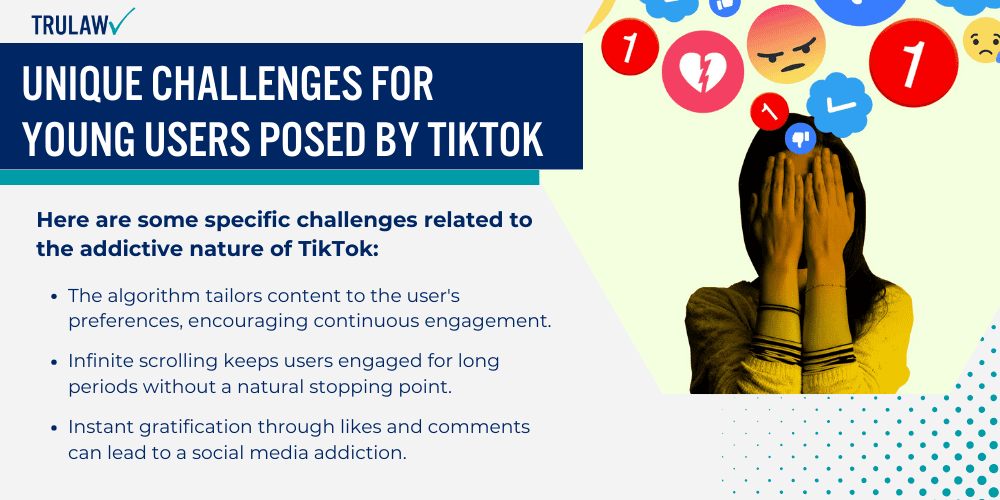
These industry-wide challenges stem from the addictive design of social media apps, the necessity for age-appropriate experiences, and the implementation of robust parental controls.
Addictive Nature of Social Media Apps
The allure of social media apps, particularly TikTok, can lead to excessive use among young users.
Here are some specific challenges related to the addictive nature of TikTok:
- The algorithm tailors content to the user’s preferences, encouraging continuous engagement.
- Infinite scrolling keeps users engaged for long periods without a natural stopping point.
- Instant gratification through likes and comments can lead to a social media addiction.
- Push notifications pull users back into the app, often interrupting other activities.
- Trending challenges create a sense of urgency and FOMO (fear of missing out), incentivizing frequent check-ins.
- In-app rewards such as badges and creator funds motivate users to spend more time on the platform.
Age-Appropriate Online Experiences
Ensuring that young users have age-appropriate experiences on TikTok is critical.
Factors affecting age-appropriate experiences online include:
- Exposure to content that may be inappropriate for certain age groups.
- The presence of advertisers targeting young users with products and services.
- Interactions with other users may not always be suitable for younger audiences.
- Privacy settings may be difficult for younger users to understand and navigate properly.
- Online challenges that could be harmful or age-inappropriate.
- The portrayal of lifestyles and behaviors that may not reflect typical, everyday experiences.
Parental Controls and User Safety
TikTok offers various parental controls and safety features to protect young users.
Effective use of these tools is essential for promoting user safety:
- Privacy settings that limit who can view and interact with the user’s content.
- Screen time management tools help parents regulate how long their children use the app.
- Content filters that work to block or minimize exposure to inappropriate material.
- Direct message controls can restrict who can send messages to the user or turn off direct messaging entirely.
- Restrictions on in-app purchases to prevent unintended spending by young users.
- Regular updates to safety features to address new risks and ensure ongoing protection for users.
Health Implications of TikTok Usage For The Next Generation
The inclusion of sensitive material and the promotion of extended screen time on TikTok pose potential risks to the mental health and well-being of younger users.
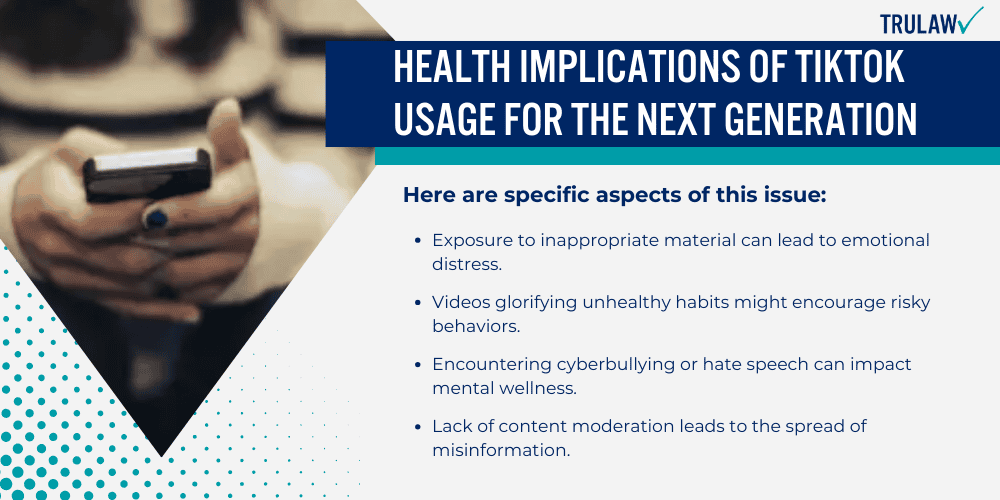
These factors may contribute to a mental health crisis due to excessive social media use.
Broadcast of Harmful Content
The broadcasting of harmful content on TikTok is a significant concern.
Here are specific aspects of this issue:
- Exposure to inappropriate material can lead to emotional distress.
- Videos glorifying unhealthy habits might encourage risky behaviors.
- Encountering cyberbullying or hate speech can impact mental wellness.
- Lack of content moderation leads to the spread of misinformation.
Encouraging Passive Consumption
TikTok encourages passive consumption, and this behavior can have detrimental effects on its users.
Consider these points:
- Endless scrolling can lead to reduced physical activity and sedentary lifestyles.
- Passive consumption diminishes creativity and active engagement with content.
- Excessive screen time is linked to sleep disturbances and poor sleep quality.
- Heavier app usage correlates with lower self-esteem and body image issues.
Social Media as a Public Health Hazard
Viewing social media as a public health hazard, especially for the next generation, underscores its serious implications.
Significant concerns include:
- Social media platforms can amplify feelings of anxiety and depression, contributing to a public health hazard.
- A strong correlation exists between heavy social media use and feelings of loneliness and isolation.
- The online world can distort reality, leading to unrealistic expectations and dissatisfaction.
- Without proper support, young individuals may struggle to support teens’ well-being amidst these pressures.
Seeking Legal Remedies in the TikTok Mental Health Lawsuit
Holding Social Media Companies Accountable
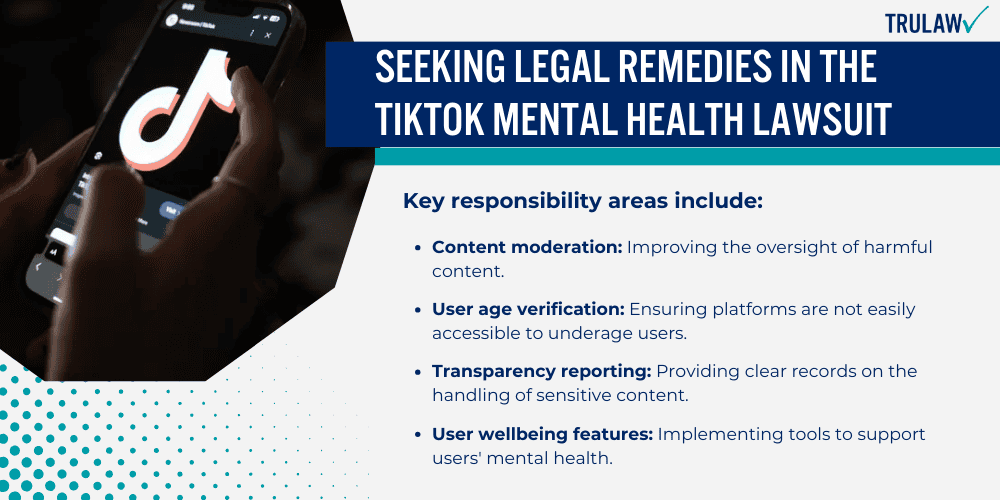
Social media companies are facing increasing pressure to take responsibility for the mental health effects their platforms have on users, particularly young people.
Key responsibility areas include:
- Content moderation: Improving the oversight of harmful content.
- User age verification: Ensuring platforms are not easily accessible to underage users.
- Transparency reporting: Providing clear records on the handling of sensitive content.
- User wellbeing features: Implementing tools to support users’ mental health.
Legal Precedents and Emerging Lawsuits
Numerous lawsuits filed against social media giants have begun shaping a legal framework that guides how these cases are addressed.
Pivotal aspects of recent lawsuits:
- Claims of negligence: Allegations that social media sites failed to protect young users from harm.
- Demands for compensation: Seeking restitution for affected users.
- Calls for platform regulation: Implementing stricter controls on social media operations.
- Evidence gathering: Compiling data on how platforms affect mental health.
Collective Action by School Districts
School districts, such as Seattle Public Schools, have initiated legal measures to combat social media’s negative impacts on students.
Steps taken by school districts include:
- Filing a lawsuit Wednesday: Seattle Public Schools took legal action against TikTok.
- Outlining the negative consequences: Describing the effects on students’ mental health and learning.
- Demanding regulatory changes: Pressuring platforms to create safer online environments.
- Partnering with legal entities: Working alongside Attorneys General and other schools.
Proactive Responses and Measures Taken by TikTok
In response to increasing scrutiny over social media‘s impact on mental health, TikTok and other social media platforms have implemented various strategies to foster a safer environment for young users.
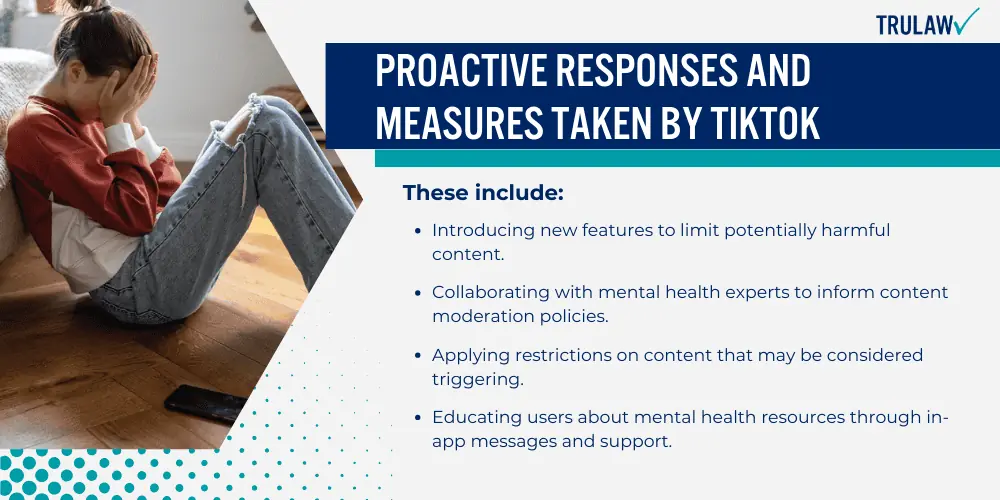
Tech Giants’ Approach to Mental Health Issues
TikTok, akin to other tech giants, has taken several steps to address mental health issues.
These include:
- Introducing new features to limit potentially harmful content.
- Collaborating with mental health experts to inform content moderation policies.
- Applying restrictions on content that may be considered triggering.
- Educating users about mental health resources through in-app messages and support.
Industry-Wide Safeguards and Best Practices
Industry leaders are working together on safeguards: algorithms to flag harmful content and industry coalitions for best practices.
They’re also offering parental controls and data sharing for research.
The social media app has aligned with industry-leading safeguards to set best practices:
- Implementing algorithms that detect and act upon content violating mental health guidelines.
- Joining industry coalitions to standardize response to mental health challenges.
- Rolling out parental control tools to monitor and regulate young users’ activities.
- Sharing data with researchers to improve understanding of social media’s impacts.
Support Systems for Young Users
Recognizing the potential impact on younger users, TikTok implements a range of features to promote safety and well-being.
This includes providing access to help resources and tools for managing screen time.
TikTok offers targeted support systems for its young users:
- Partnering with organizations to provide direct support and counseling services.
- Creating a ‘Digital Wellbeing’ suite within app settings for user controls.
- Increasing transparency around community guidelines and user reports.
- Introducing in-app prompts to encourage breaks and mindful usage.
Industry-Wide Safeguards and Best Practices on TikTok
TikTok has implemented several measures to mitigate negative impacts on users’ mental health, with specific attention to eating disorders and suicide prevention.
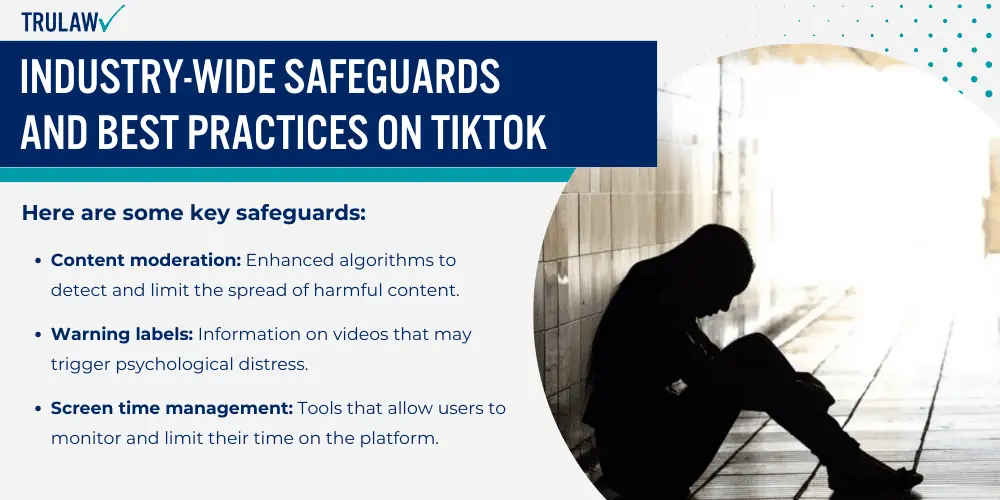
Impact on Mental Health Problems
TikTok’s role in influencing mental health has been under scrutiny, which has led the platform to adopt new guidelines and tools.
Here are some key safeguards:
- Content moderation: Enhanced algorithms to detect and limit the spread of harmful content.
- Warning labels: Information on videos that may trigger psychological distress.
- Screen time management: Tools that allow users to monitor and limit their time on the platform.
- Mental health resources: Direct access to support for users experiencing mental health issues.
Correlation with Eating Disorders and Suicide Attempts
The potential correlation between TikTok usage and the exacerbation of eating disorders and suicide attempts has prompted action.
Here are specific measures taken:
- Proactive support: Pop-up messages offering help when users search for sensitive terms.
- Collaboration with experts: Engagement with mental health organizations to develop supportive content.
- Educational content: Promotion of positive body image and mental health awareness videos.
- User reporting tools: Features that allow the community to report concerning behavior anonymously.
Frequently Asked Questions
-
What are the grounds for the mental health lawsuit against TikTok?
Legal actions against TikTok are being pursued on several fronts, including allegations that the platform harms young users’ mental health and investigations into whether TikTok violates state consumer protection laws.
Additionally, concerns have been raised about the role of TikTok in potentially facilitating addictive behavior among minors and claims of negligence in safeguarding children’s well-being online.
-
How have similar social media lawsuits impacted platform policies?
The outcomes of prior lawsuits have resulted in significant policy changes among traditional social media companies.
These changes typically include enhanced safety measures for younger users, increased transparency regarding algorithmic operations, more stringent content moderation practices, and the introduction of well-being tools for monitoring usage.
-
What legal responsibilities do social media platforms have to user mental health?
The impact of social media on mental health is a topic of concern, and social media platforms have a responsibility to protect users from harmful content and mitigate potential contributions to mental health disorders.
This includes providing users with tools to manage their interactions and promptly addressing identified risks related to user mental health.
-
Is it possible for individuals to take legal action against social media entities?
While social media platforms are not entirely immune from lawsuits, successfully suing them can be challenging.
To have a strong case, individuals need to establish a clear connection between the platform’s design or practices and the harm they suffered.
-
What precedents exist concerning mental health and social media company liability?
The legal landscape is constantly changing as courts grapple with the intricate interplay between social media platforms, user well-being, and potential harms.
Legal precedents in this domain are continually evolving, as courts consider the extent of the duty of care owed by social media companies to their users
-
How are social media platforms responding to mental health-related legal challenges?
Social media platforms are adapting to various challenges by implementing a range of strategies.
In response to legal challenges, these platforms are introducing new features aimed at reducing usage among younger demographics and developing resources for mental health support and education.

Experienced Attorney & Legal SaaS CEO
With over 25 years of legal experience, Jessie is an Illinois lawyer, a CPA, and a mother of three. She spent the first decade of her career working as an international tax attorney at Deloitte.
In 2009, Jessie co-founded her own law firm with her husband – which has scaled to over 30 employees since its conception.
In 2016, Jessie founded TruLaw, which allows her to collaborate with attorneys and legal experts across the United States on a daily basis. This hypervaluable network of experts is what enables her to share reliable legal information with her readers!
You can learn more about the Social Media Harm Lawsuits by visiting any of our pages listed below:
Here, at TruLaw, we’re committed to helping victims get the justice they deserve.
Alongside our partner law firms, we have successfully collected over $3 Billion in verdicts and settlements on behalf of injured individuals.
Would you like our help?
At TruLaw, we fiercely combat corporations that endanger individuals’ well-being. If you’ve suffered injuries and believe these well-funded entities should be held accountable, we’re here for you.
With TruLaw, you gain access to successful and seasoned lawyers who maximize your chances of success. Our lawyers invest in you—they do not receive a dime until your lawsuit reaches a successful resolution!
Do you believe you’re entitled to compensation?
Use our Instant Case Evaluator to find out in as little as 60 seconds!
Camp Lejeune’s water contamination issue spanned several decades starting in the 1950s. Exposure to these chemicals has been linked to various serious health issues, including cancer, organ diseases, and death.
Research is increasingly suggesting a link between the use of Tylenol during pregnancy and the development of neurodevelopmental disorders, such as autism and ADHD, in infants.
Legal action is being taken against manufacturers of Aqueous Film-Forming Foam (AFFF), a chemical used in fighting fires. The plaintiffs allege that exposure to the foam caused health issues such as cancer, organ damage, and birth and fertility issues.
Here, at TruLaw, we’re committed to helping victims get the justice they deserve.
Alongside our partner law firms, we have successfully collected over $3 Billion in verdicts and settlements on behalf of injured individuals.
Would you like our help?
